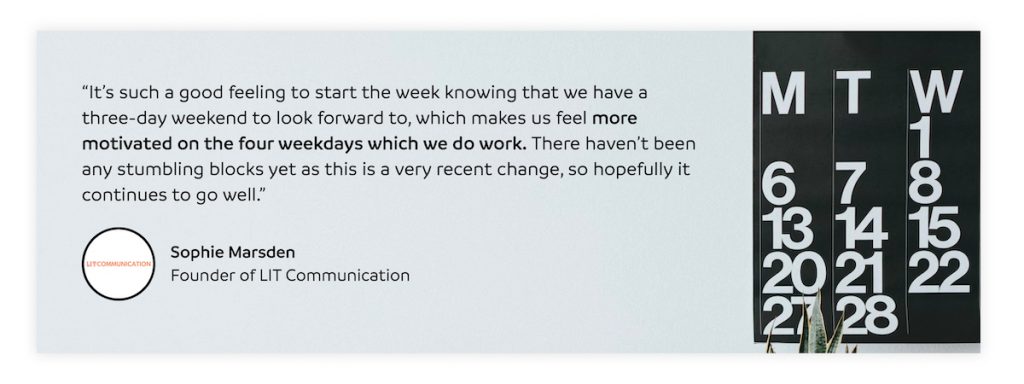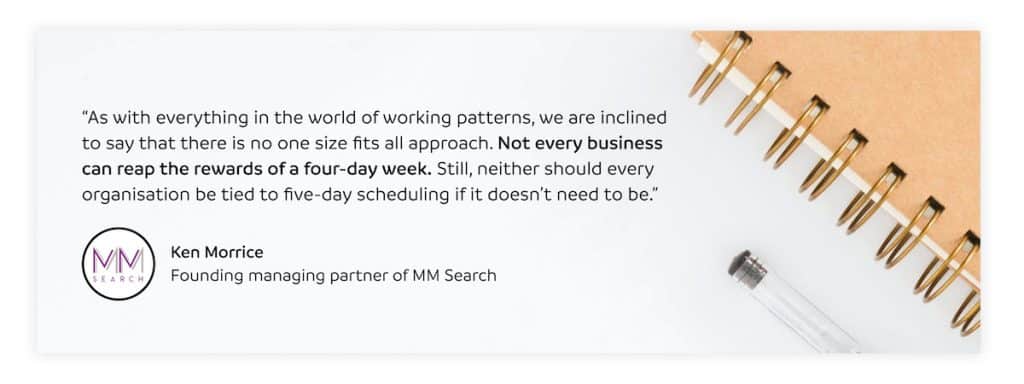
Amid increasing levels of employee stress and burnout, some businesses in the UK are considering what might have been unthinkable to many a few years ago: reducing the working week to four days.
Undoubtedly, it is a controversial idea – but is it a good one? Or are there better ways to promote employee productivity and wellbeing?
30 companies across the UK are currently taking part in a six-month trial of the four-day work week, with employees being paid the same amount as if they were working for their usual five days.
The pilot scheme is organised by researchers at Cambridge University, Oxford University and Boston College, and, together with think tank Autonomy, will measure whether employees can operate at the same productivity levels for 80% of the time.
With calls for these companies to ‘not screw it up for the rest of us’, what do HR and business leaders really make of the calls for a shorter working week?
We spoke to five HR experts, business leaders and owners to get their take on the proposed shorter workweek and whether it would work in reality in their businesses.
For some, a shorter working week is conducive to a better work/life balance. With the aim of improving the quality of life for employees, having three days off will provide more time to focus on their personal and family lives.
COVID has changed employees’ lives and priorities
The pandemic created a huge shift in the way employees view their jobs and what they want from life in general. Sophie Marsden is the Founder of LIT Communication and, since hiring her first employee, a four-day workweek has been the norm: “I have recently hired my first employee at LIT Communication and decided to implement a four-day week from the beginning. I’m passionate about work/life balance and have a strong people before profit mentality, and wanted to reflect this in the way we operate as a business.
“This has been possible for us through clear communication with our clients about the changes; but I can see how this could be difficult for a more established business to implement.”
The ultimate dream?
For many employees, however, a four-day workweek sounds like a dream come true!
Philip Dawson is from Lily Arkwright; the UK’s premier ethical lab diamond company, and he shared this sentiment before becoming managing director of the company:
“A four-day week you say? This was always a long-held ambition as an employee, more downtime and a renewed appetite for work I’d tell my superiors, is it really possible? Fast forward ten years and the shoe is firmly on the other foot!”
In some industries, the four-day working week can work. However, it is clearly not for every business or industry – or every individual for that matter. Phil puts the argument for or against the four-day workweek quite simply: “Can it work? Yes. Does it work? Sometimes.”
A four-day workweek is not for everyone
Ken Morrice, founding managing partner of executive recruitment firm MM Search, agrees: “As with everything in the world of working patterns, we are inclined to say that there is no one size fits all approach. Not every business can reap the rewards of a four-day week. Still, neither should every organisation be tied to five-day scheduling if it doesn’t need to be.
“Some of our clients, particularly those in the food production industry, will operate on a 24/7/365 basis, making a shorter week not possible.”
“We’ve come to the conclusion a four-day week is a net positive and is viable. Ultimately, the key is having a flexible workforce that is happy and willing to accept change.”
And yet, the four-day work week won’t be for everyone. Not every employee will relish a longer weekend, and it is important that flexibility remains.
Will a four-day workweek satisfy a demand for increased flexibility?
Introducing a four-day workweek may be a strategy some employers use in the very near future in order to attract candidates in support of ‘work to live’ not ‘live to work’ attitudes. Importantly, as Nick Brand from OnSkil explains, it is key that businesses have the tech and tools in place to support a shorter working week, promote flexibility and ensure employee productivity where it is needed, while respecting employee preferences. “To get great hires, employers need to offer a value proposition that is meaningful to them. Flexibility is also essential for diversity and inclusivity, as it means that all needs can be catered for, and we must be responsive to what people want.”
“Some people need to take more time of a weekend, or a day off in the week, and businesses shouldn’t judge that. It’s not a one-way thing – the fact is that a happy and motivated employee is a productive employee. It’s good for people, and good for business.”
Or is a four-day workweek just a fast-track to burn out?
On the other hand, does a four-day workweek simply mean that those four days are far more intensive and ultimately, more stressful for employees – entirely negating the benefits that a three-day weekend may bring?
The goal of the trial that is currently in progress is to evaluate whether employees can complete 100% of their work in 80% of the time for 100% of the pay. That in itself could lead to surges in burnout and could, in reality, lead to a drop in productivity with employees quickly becoming overwhelmed with the increased work to complete in a shorter time frame.
A study carried out in 2020 found that 52% of employees that were experiencing burnout cited workload as the biggest contributor to their feelings of being burned out. A further 32% cited time pressures and 24% performance expectations.
Subira Jones (aka The Corporate Hippie), Founder of MPWRD Consulting shares how the four-day workweek could well do more harm than good: “Reducing the amount of days someone is expected to work, will NOT prevent burnout, it could expedite it for many and as far as preventing The Great Resignation, we may just be kicking the can down the road.
“As someone who has worked a full-time contract over four days, I loved it, it gave me the freedom and recovery time I needed, given I was working and running my own separate business. But the reality is my workload did not decrease and those four days were much longer.
“This is likely to be the reality for many who are already working a four-day week, on a full-time contract.”
The bottom line
2021 was a whirlwind for HR and, after the events of 2020, the world of work has been completely transformed for many of us.
As workers around the globe quit their jobs as part of “The Great Resignation” and companies re-evaluate their flexible working arrangements, extensive debate about the plausibility of a four-day work week continues to polarise entire businesses.
While some companies may succeed in introducing a shorter work week and reap significant benefits, such as increased productivity and more time for employees to pursue personal hobbies and goals – a four-day workweek simply will not work for all industries, businesses or individuals.
And yet, with work-related stress levels reaching breaking point and the increase in mental health issues among employees, maybe the current model of work is becoming increasingly unsustainable and change is needed as matter of urgency.






